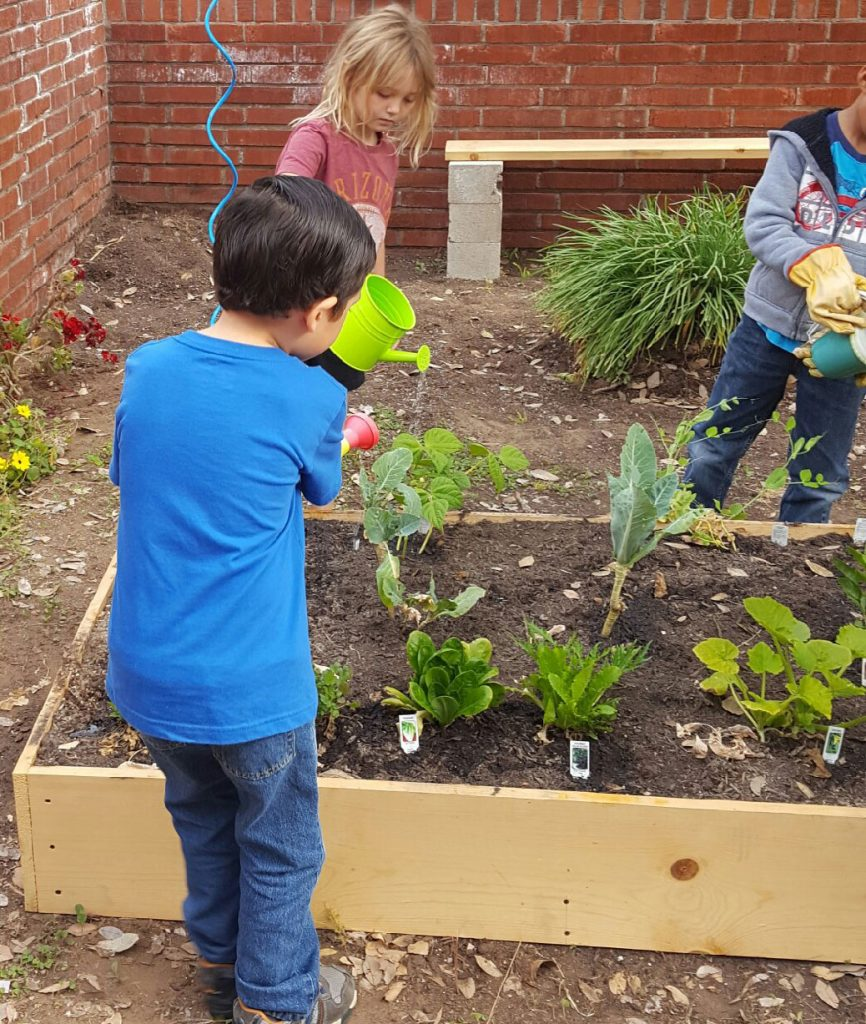School Garden Support

A school garden is the perfect outdoor classroom. A garden can be used as a space for learning about nutrition and agriculture, for experiencing and exploring nature, and for teaching school subjects such as science, math, writing, reading, art, and music.
Since 1999, the RCD has provided resources, training, and information to K-12 educators interested in teaching in the garden and encouraging students to appreciate fresh food and learn about the food cycle.
In the past, we have worked on state-wide and local partnership programs to deliver training for school staff and community partners to bring more fresh fruits and vegetables into schools and to use the garden as a tool for teaching about healthy eating.
Each year, we coordinate a Plant Giveaway for school gardens with plants generously donated by Altman Plants in Vista. Schools receive a flat of warm season vegetable and herb seedlings and have the option of collecting their plants from one of five pick-up points around the county.
Sign ups for our 2025 Plant Giveaway are now open! You can sign up to pick up a flat here!
Event registration is offered on a first come first serve basis and will close at 12:00pm on Tuesday, March 11th. Please forward this invite to teachers who may be interested in free plants!
At Home Learning Activities
Make a Model of a Habitat: Study how animals and plants adaptGoals: Identify what the factors that can lead to changes in the habitat and differentiate between man-made and natural factors. Understand the impact of human actions on other life forms. Understand how different animals and plants adapt to changes in their habitat. Identify what is creating pollution and ways to reduce it.
Make a Mini LandfillGoal: To have students examine the materials that comprise the products they use, describe whether these materials are renewable or nonrenewable resources, observe what happens to materials when placed in a landfill and decide whether they should be disposed of in a different way.
Cutting Class TrashGoal: To have students realize that the reuse and recycling of materials isn’t the main solution to the solid waste problem. A key step is to cut down on the use of materials that end up in our landfills and recycling centers. Collect your trash for up to a week.
How Polluted Water Affects FoodGoals: Understand how pollution hurts nature and people because we need clean water to grow healthy too. Identify solutions to reducing our pollution.
Renewable Energy: Make a Solar Cooker!Goals: Understand what renewable energy is and the benefits. Identify what non-renewable resources are.
School Garden Newsletters
We believe that everyone should have access to grants and free educational events so we publish newsletters every season to keep schools informed on current opportunities to help their students and garden flourish!
Spring 2025 - Plant Giveaway 2025
Winter 2025 - Kindness in the Garden, Creating Seed Libraries, & New Opportunities for Gardens
Fall 2024 - Latin Food History, Holiday Activities, & Grant Opportunities
Summer 2024 - Sensory Gardening, Pollinator Water Stations, & Summer Programming
Spring 2024 - Plant Giveaway 2024
Winter 2024 - Raised Beds, Refridgerated Pickles, & Kids to Parks Day
Sign Up for our School Garden Newsletter!

Collective School Garden Network (CSGN): Information and resources for planning, planting, teaching in, and sustaining a school garden.
Kids Gardening: Lots of gardening tips, educator resources, and grant sources.
Life Lab: A wealth of information and resources for creating, sustaining, and teaching in a school garden.
Master Gardener Association of San Diego: Sign up to get a Master Gardener to support your school garden, and find info about grants for school gardens.
Pollinators in the Garden: Are you interested in attracting more monarch butterflies and other pollinating insects to your school garden? Check out our Milkweed for Monarchs program!
